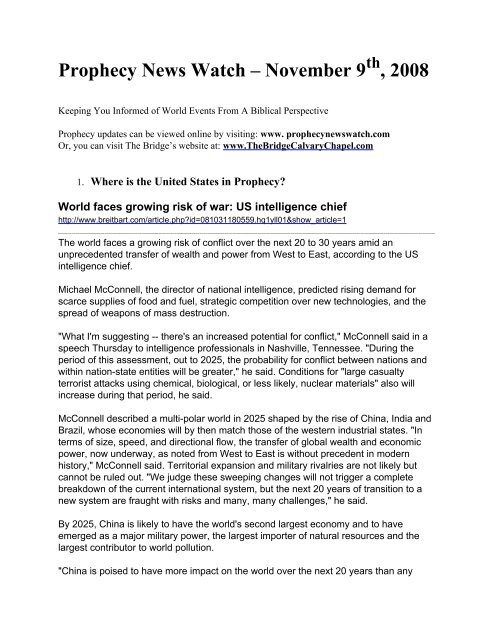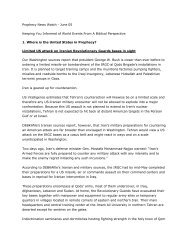Prophecy News Watch â November 9 , 2008 - The Bridge Calvary ...
Prophecy News Watch â November 9 , 2008 - The Bridge Calvary ...
Prophecy News Watch â November 9 , 2008 - The Bridge Calvary ...
You also want an ePaper? Increase the reach of your titles
YUMPU automatically turns print PDFs into web optimized ePapers that Google loves.
<strong>Prophecy</strong> <strong>News</strong> <strong>Watch</strong> – <strong>November</strong> 9 th , <strong>2008</strong>Keeping You Informed of World Events From A Biblical Perspective<strong>Prophecy</strong> updates can be viewed online by visiting: www. prophecynewswatch.comOr, you can visit <strong>The</strong> <strong>Bridge</strong>’s website at: www.<strong>The</strong><strong>Bridge</strong><strong>Calvary</strong>Chapel.com1. Where is the United States in <strong>Prophecy</strong>?World faces growing risk of war: US intelligence chiefhttp://www.breitbart.com/article.php?id=081031180559.hq1yll01&show_article=1<strong>The</strong> world faces a growing risk of conflict over the next 20 to 30 years amid anunprecedented transfer of wealth and power from West to East, according to the USintelligence chief.Michael McConnell, the director of national intelligence, predicted rising demand forscarce supplies of food and fuel, strategic competition over new technologies, and thespread of weapons of mass destruction."What I'm suggesting -- there's an increased potential for conflict," McConnell said in aspeech Thursday to intelligence professionals in Nashville, Tennessee. "During theperiod of this assessment, out to 2025, the probability for conflict between nations andwithin nation-state entities will be greater," he said. Conditions for "large casualtyterrorist attacks using chemical, biological, or less likely, nuclear materials" also willincrease during that period, he said.McConnell described a multi-polar world in 2025 shaped by the rise of China, India andBrazil, whose economies will by then match those of the western industrial states. "Interms of size, speed, and directional flow, the transfer of global wealth and economicpower, now underway, as noted from West to East is without precedent in modernhistory," McConnell said. Territorial expansion and military rivalries are not likely butcannot be ruled out. "We judge these sweeping changes will not trigger a completebreakdown of the current international system, but the next 20 years of transition to anew system are fraught with risks and many, many challenges," he said.By 2025, China is likely to have the world's second largest economy and to haveemerged as a major military power, the largest importer of natural resources and thelargest contributor to world pollution."China is poised to have more impact on the world over the next 20 years than any
other country," he said.India will have either the third or second largest economy and will press to become "oneof the significant poles of this new world," he said.Russia also will be part of that group but only if it expands and diversifies its economyand integrates it with the world global economy, he said."Strategic rivalries are most likely to revolve around trade, demographics, access tonatural resources, investments and technological innovation. <strong>The</strong>re will be a struggle toacquire technology advantage as the key enabler for dominance," he said.White House ‘very concerned’ about transition attackhttp://www.politico.com/news/stories/1108/15368.htmlWhite House press secretary Dana Perino warned Thursday that the administration is“very concerned” about the threat of a terror attack during the transition or the earlyweeks of the Obama administration.“That is something that we're very concerned about,” Perino said. “We've seen that inother countries — Spain, obviously, had that terrible bombing.”Perino said that “we know that Al Qaeda and others try to test a new administration,”echoing Vice President-elect Joe Biden, who caught flack for a similar statement on thecampaign trail.Perino added that the Bush administration is “determined” to make sure that "weoverlap in terms of our understanding and capabilities so that ... when we hand thebaton over to the Obama team, that they have that full range of capabilities and also allthe knowledge that they need to help continue to keep us safe.”“I don't know of anything specific,” she added, “but we do know that this is just aheightened period of concern.”President of the World?http://elections.foxnews.com/<strong>2008</strong>/11/06/nations-look-obama-president-world/Barack Obama's election on Tuesday set off international celebrations and ignited afervor for the United States that has been unseen since the days immediately followingthe September 11, 2001, terror attacks.To some observers, the international reaction has elevated America's president-elect toan unparalleled post: president of the world.
In Kenya, where Obama's father was born, a national holiday was declared onThursday. In Indonesia, children danced at the school Obama attended when he was ayoung boy, embracing him as much for what he represents abroad as for the policies headvocates at home."People from all over Africa, especially in Kenya, where this is a holiday, are feeling thatthe most powerful person in the world does not have to be a white guy. That's a hugebreakthrough for the United States and for humanity," said Walter Russell Mead, theHenry A. Kissinger senior fellow for U.S. Foreign Policy at the Council on ForeignRelations."This is the fall of the Berlin Wall times ten," Rama Yade, France's junior minister forhuman rights, told French radio. "On this morning, we all want to be American, so wecan take a bite of this dream unfolding before our eyes."America's popularity abroad waned dramatically during the Bush administration, andsome voters expressed hopes that in electing Obama, they could restore the country'simage. <strong>The</strong> wave of good feelings since Tuesday night suggests that even before takingoffice, Obama has made substantial inroads."This may be the beginning of a new world. It marks the end of old elites and opens thedoor for new approaches worldwide," an Israeli man in his mid-50s said in Tel Aviv.Foreign observers, who paid rapt attention during the long election season, are taking apersonal stake in the outcome of a vote a world away. Expectations are high for the47-year-old Obama, who will take over on January 20 amid a financial collapse and whowill preside over two wars on his first day in office."<strong>The</strong> standing of everybody in the world is going to be affected by what PresidentObama does or doesn't do," said Mead, noting that all eyes will be looking to the newpresident for a way out of the global financial crisis.In the Muslim world, the response has been mixed. A journalist with a pan-Arab newschannel told FOX <strong>News</strong> that on election night, workers were going around thenewsroom congratulating each other, as if Obama were their president-elect.Iraqis have expressed skepticism that any rapid changes will come as a result of theelection, but many see their fates ineluctably tied to Obama's foreign policy. "By God,the new American President Obama has promised to pull the troops out. This is in thebest interest of the Iraqi people," said one Baghdadi.Arab heads of state have been more circumspect, waiting to see whether Obama'sMideast policy will depart significantly from that of the Bush administration, and somenewspapers in the Arab world have openly announced their distrust of the presidentelect.
"<strong>The</strong>re is no significant difference between Obama and McCain. <strong>The</strong>y disagree only onthe means to achieve America's chief goal, which is to rule for another hundred years,"said an editorial in the Saudi daily Al-Watan, according to the Middle East MediaResearch Institute, which monitors the Arab press.Iranian President Mahmoud Ahmadinejad congratulated Obama Thursday for his win --the first time an Iranian leader has welcomed an incoming president since the 1979Islamic Revolution. And some Iranians, speaking to FOX <strong>News</strong>, said they were excitedby the prospect of the coming administration."I want to congratulate you on Barack Obama's victory that really turned a new chapterin the world's history -- that an African-American man, decent and intelligent, becamepresident of the world," one Iranian said."This was done in America. Your nation has the credit for it."Not all observers expect this world embrace to be long-lasting. "I think overseas, as athome, opinion over the longer term will depend on what he actually does," said JohnBolton, former U.S. ambassador to the United Nations.Obama was issued an early challenge Wednesday, as Russian President DmitryMedvedev ordered the deployment of short-range missiles near his country's borderwith Poland."Those who have issues with us are certainly not giving him a honeymoon," Bolton saidof Russia's action, which may have been intended to send a cold word of welcome toObama and to test his resolve.Russian citizens, too, have been wary in their evaluation of the next president."I don't think he can really become the world political leader," said Tatyana Solomonova,a real estate agent in Moscow. "<strong>The</strong> fact that he's black can be an obstacle -- there'sstill a lot of racism in the world, in Europe and Russia too. I think he can take a leadingrole in the Western hemisphere, but not in this part of the world."In Moscow Thursday, Italian Prime Minister Silvio Berlusconi, who has a history ofcontroversial remarks, was asked by a reporter about the prospect for U.S.-Russianrelations after Berlusconi met with Medvedev.Berlusconi responded by saying that the relative youth of Medvedev, 43, and Obamashould make it easier for Moscow and Washington to work together.<strong>The</strong>n he said, smiling: "I told the president that [Obama] has everything needed in orderto reach deals with him: he's young, handsome and even tanned."
Italian news agencies said Berlusconi later defended his remark, calling the statement"a great compliment.""Why are they taking it as something negative? ... If they have the vice of not having asense of humor, worse for them," the ANSA news agency quoted him as saying.But Italy's only black lawmaker, Jean-Leonard Touadi, called the commentembarrassing."In the United States, a joke like that wouldn't just be politically incorrect, but a greatoffense to this amazing example of integration, which it seems the Italian premiershould take as an example," Touadi said.For good or ill, all eyes are now on Obama."Not everybody is going to get what they want, but this is a moment of hope," saidMead, who added that Obama was sure to fall short of some expectations."If you look at Jesus Christ, he walked on water and fed the 5,000 and he ended upgetting crucified, so I think it's not unlikely that President-elect Obama is gonnadisappoint some people also."2. Israel - God's Timepiece'Peace pact unlikely by year's end'http://www.jpost.com/servlet/Satellite?cid=1225910046353&pagename=JPost%2FJPArticle%2FShowFullUS Secretary of State Condoleezza Rice on Thursday all but conceded that an Israeli-Palestinian peace deal by a year-end deadline is no longer possible, but said it isimportant for the next US and Israeli leaders to maintain momentum and support for thenegotiations.Rice spoke as she arrived for her eighth trip to Israel and the Palestinian territoriessince the parties set the timeline for reaching an agreement at last <strong>November</strong>'s summitat Annapolis, Maryland."It is our expectation that the Annapolis process has laid groundwork which shouldmake possible the establishment of a Palestinian state when the political circumstancespermit," Rice said. "I think that whatever happens by the end of the year, you've got afirm foundation for quickly moving this forward to conclusion."
Although Rice refused to absolutely rule out the chance of an agreement by year's end,her remarks reflect the first time that an official of the Bush administration has publiclynot held out hope that the deadline could be met."We'll see where they are at the end of the year," said Rice, vowing to "work on this withthe parties until the day that we leave."Fighting irrelevance and a ticking clock, US Secretary of State Condoleezza Riceembarked Wednesday on yet another Middle East peacemaking trip, hoping to securefragile Israeli-Palestinian negotiations and leave a viable process for the incomingObama administration.With just 77 days left in office, Rice was making her eighth trip to Israel and thePalestinian territories since the parties set a year-end goal of reaching a peace deal atlast <strong>November</strong>'s Annapolis peace conference. She will also visit Egypt and Jordan toshore up Arab support for the talks.Meeting the target date for an agreement is now highly unlikely, especially with politicaluncertainty in Israel and the lame duck Bush administration's waning influence, but Riceintends to press the two sides to carry on and, if possible, come up with an outline ofhow they can move ahead after January 20.<strong>The</strong> Israeli-Palestinian situation is one of several Middle East trouble spots that theBush administration will bequeath to President-elect Barack Obama. <strong>The</strong> war in Iraq,Iran's nuclear program and troubles with Syria are among the most troublesome.Obama has yet to offer specifics on how will approach the peace process, but hisforeign policy advisers include many former Clinton administration officials who wereactively involved in the 2000 Camp David talks and may be eager to re-enter the fray.Still, Rice has made clear she will not give up on the push for an Israeli-Palestinian dealwhile she is on the job."Until that moment when I leave office, I will leave no stone unturned to see if we canfinally resolve this conflict," she told an audience at a Palestinian investment forum lastmonth in Washington.Those comments were her last substantive remarks on the peace process and in them,she made the same twin challenges to Israel and the Palestinians she has made onmore than 20 largely fruitless journeys to the region during her tenure as secretary ofstate: Israel should loosen its grip on the West Bank and the Palestinians should tightentheirs on terrorists.
"<strong>The</strong> parties need to redouble their efforts," Rice said.<strong>The</strong> talks that began in the US last year have produced few tangible results and areexpected to be placed on hold for at least several months during the US transition fromBush to Obama. In addition, Israel will hold elections on February 10 and there arequestions about the tenure of Palestinian Authority President Mahmoud Abbas whoseterm technically expires in January.Rice will see Abbas and outgoing Prime Minister Ehud Olmert along with the chiefnegotiators from both sides before heading to the Red Sea resort of Sharm e-Sheikh inEgypt where top officials from the international diplomatic "quartet" on the Middle Eastwill be briefed on the status of the talks on Sunday.Any results officially reported to the quartet - the European Union, Russia, the UnitedStates and the United Nations - from Palestinian-Israeli talks so far could become abasis for future negotiations, even after the Israeli election.Time for Israel to appoint a king, scholar sayshttp://www.israeltoday.co.il/default.aspx?tabid=178&nid=17448Renowned Israeli biblical scholar and historian David Solomon last week said thatconditions in Israel today are ripe for replacing democracy with theocratic monarchy andappointing a king.Speaking to Israel National Radio, Solomon said that the leadership and religious crisescurrently facing Israel mirror those during the time of the Prophet Samuel.Millennia ago, the people of Israel turned to Samuel to help them replace their form ofgovernment with a monarchy in order to alleviate the nation's problems.Just as then, many Israelis today might view a theocratic monarchy as a viable answerto Israel's "disastrous absence of genuine political and spiritual and religiousleadership," said Solomon.Will Israel strike at Iran before Obama takes over?http://www.jpost.com/servlet/Satellite?cid=1225910057503&pagename=JPost%2FJPArticle%2FShowFullOn December 8, 1988, under the cover of night, IDF warplanes, helicopters, guidedmissilefrigates and an elite force of Flotilla 13 naval commandos and Golani Brigadereconnaissance fighters infiltrated Lebanon. <strong>The</strong>ir target was a cave-basedheadquarters 20 km. south of Beirut, serving the Popular Front for the Liberation ofPalestine-General Command, headed by Ahmed Jibril.<strong>The</strong> raid, code-named Operation Blue and Brown, involved the first known use of the
IDF's secretive Oketz K9 dog unit. Four soldiers found themselves left behind, forcingthe air force to conduct a dramatic helicopter rescue. <strong>The</strong> soldiers clung to thehelicopters' railings as they choppers took off, with Palestinian gunmen in pursuit.Lt.-Col. Amir Meital, commander of Golani reconnaissance unit, was killed by enemy fireduring the raid.<strong>The</strong> operation took place one month after US President George H. Bush was voted intooffice, and a month before he was sworn in, replacing the popular Ronald Reagan, aleader widely viewed as a staunch ally of Israel.Operation Blue and Brown says nothing about the likelihood of an Israeli strike on Irantoday. But it does show that IDF operations have been ordered in the interim periodbetween the election of a new American president and his inauguration.And it is this same period in <strong>2008</strong>/09 that provides an "attractive date" for Israel to strikeIran's nuclear program, according to historian Benny Morris.In June, Morris wrote an op-ed for <strong>The</strong> New York Times in which he theorized that Israelwould likely strike Iran between <strong>November</strong> 5 and January 19, the day before Obama issworn in.Speaking to <strong>The</strong> Jerusalem Post this week, Morris said he continued to believe thattime period was a "reasonable" one for Israeli action. "<strong>The</strong>re is certainly a friendlypresident in the White House until January 20. <strong>The</strong>re is no certainty over what willhappen after that, in which direction the wind will blow.<strong>The</strong> second thing is the advancement by the Iranians in creating the bomb," Morris said,speaking from his home in Li'on, southwest of Beit Shemesh. Morris said the Iranianregime was guided by messianic clerics who could not be trusted to act logically in astate of mutually assured destruction (MAD)."<strong>The</strong>se men are not rational like the men who ruled America and Russia during the ColdWar. When [President Mahmoud] Ahmadinejad talks about destroying Israel and deniesthe Holocaust, we hear no contrary voices from the Supreme Leader AyatollahKhamenei saying that Ahmadinejad is crazy," Morris said. "So long as Iran makesprogress, we are under pressure, if we plan on doing something. Iran is supposed topurchase advanced anti-aircraft guns from Russia at the start of 2009. All of these pointto the fact that if the US provides support, an Israeli strike is reasonable," he said.Acknowledging the lame-duck nature of the Olmert administration, Morris said thedifficulties posed by a weak government could be overcome by notifying the leaders ofthe major political parties in advance of the attack. He even raised the possibility that adate had already been chosen.
But Morris's views were challenged by a number of Israeli defense experts, such asMaj.-Gen. (res.) Giora Eiland, former national security adviser and former head of theIDF's Planning and Operation branches. "I don't agree that Bush has given us a greenlight to attack in the next three months. Israel can't attack without US approval, which isvital both tactically and strategically. At the moment, we don't have that approval," hesaid.Eiland provided an alternative forecast, according to which Obama will spend somemonths assembling an international front aimed at applying real pressure on Teheran toends its nuclear program, something Bush had so far failed to do."To make the pressure on Iran effective, you have to cooperate with states like Russia.But the Russians say, 'Our main problem is that you [the Americans] are deliberatelyharming our interests by criticizing our internal policies, our actions in Chechnya, andwith your attempts to drag neighbors like Georgia and Ukraine into NATO. So long asthat's the case, don't expect us to help on Iran.'"Noting that Russia is continuing to supply Teheran with nuclear technology andeconomic ties, Eiland said it would be impossible to isolate Iran without Russianassistance. This was all the more true in light of the fact that China and India hadsignaled that they would follow Russia's guidance over Iran, Eiland added."So I assume that the Obama government will correctly recognize the Iranian threat, butit will try to construct an international front," he said.If, however, that policy failed, Obama could seriously consider using force, or supportan Israeli strike several months from now, Eiland said.Col. (res.) Ephraim Kam, formerly of Military Intelligence's Research Division andcurrently the deputy head of Tel Aviv University's Institute for National Security Studies,said a number of questions needed to be answered before determining whether a strikecould go ahead."We don't know what Bush wants. In order to know whether the time is right for anattack, the government must know the stance of the Americans, and the state of ourintelligence. Do we have the precise information that we need? What is the evaluationof an Iranian response? Is the Iranian threat existential?" Kam asked.<strong>The</strong> government did not have those answers at this time, "hence the decision to attackcannot be made," he said.Dr. Emily Landau, director of the Arms Control and Regional Security Project at theInstitute for National Security Studies, said that aside from the diplomatic situation that
altered with Obama's election, she could see no changes in "terms of the pros and consof Israel taking some kind of action.""Iran is advancing its program all the time. Where is the exact window of opportunity? Idon't think the timing can be so fine-tuned as to give an exact date. It all boils down tothe larger question of what you want to gain through military action. And this is thesituation we've been faced with for the past few years," she said.Landau said military action would likely not stop Iran's nuclear program, or even delay itsignificantly. Much of the talk of a strike formed part of an attempt to pressure Iran, andto keep it thinking that "there was a credible threat there. And the purpose of that is toget Iran to finally negotiate seriously," she said."Even if military action was used, it would ultimately have to lead to some kind ofnegotiation to get a deal," Landau said.3. A Revived Roman Empire?Mediterranean Union agrees on Barcelona as headquarters, Arab-Israeli rolehttp://afp.google.com/article/ALeqM5gzBNI6Di29bPocrAVLXgwufCAVswForeign ministers from the new Mediterranean Union struck a deal Tuesday forBarcelona to host the forum's headquarters and for Israel and the Arab League to takepart side-by-side.<strong>The</strong> Union's 43 member states held two days of talks in the port of Marseille to end afour-month deadlock on the two contentious issues, which threatened to hamstring thefledgling organisation.French Foreign Minister Bernard Kouchner and Egyptian Foreign Minister Ahmed AbulGheit, whose countries currently co-chair the forum, announced the breakthrough at ajoint news conference in the southern French city."It wasn't supposed to work, and yet it did," said Kouchner, adding: "<strong>The</strong> essential pointswere accepted completely and without reservation by all 43 states" in the Union for theMediterranean.Ministers from the Mediterranean's mainly-Arab southern rim agreed to back theSpanish city of Barcelona's candidacy to host the Union in exchange for the post ofsecretary-general going to a southern member.
<strong>The</strong>y also clinched a deal on granting the Arab League a full-time seat at the forum -- akey demand of Arab members, strongly opposed by Israel which feared the pan-Arabgroup would try to block its involvement."<strong>The</strong> Arabic participation will take place in every meeting with the right to speak at alllevels," said Abul Gheit, although it will have no right to vote.Israel agreed to the Arab League's role in exchange for one of five deputy secretarygeneralposts for an initial three-year period, possibly renewable.<strong>The</strong> deputy posts will rotate between three European members and two southern ones,and will initially be held by the Palestinian Authority, Greece, Malta and Italy, alongsideIsrael, according to the final declaration.<strong>The</strong> text -- with likely technical amendments -- still has to be formally ratified however bythe two co-presidents of the Union, French President Nicolas Sarkozy and his Egyptiancounterpart Hosni Mubarak.Launched at a Paris summit in July, the new union brings together EU members withstates from north Africa, the Balkans, the Arab world and Israel in a bid to fostercooperation in one of the world's most volatile regions.An Israeli diplomat said it agreed to the Arab League "compromise" on the basis itwould be able to play a front-seat role in setting up the fledgling Union, and hopefullybuild bridges around the Mediterranean.But she warned "the Barcelona Process can never replace direct bilateral negotiations"to resolve Israel's conflicts with Arab nations.A spokesman for the Arab League also warned that its participation would not lead tonormalisation with Israel, Egyptian state news agency MENA reported.EU foreign policy chief Javier Solana said he was "delighted" by the accord onBarcelona, while EU external relations commissioner Benita Ferrero-Waldner called it a"logical choice."<strong>The</strong> Mediterranean capital of Spain's Catalonia region, Barcelona lent its name to the13-year-old Barcelona Process, a previous EU regional initiative that stalled in part overArab-Israeli disputes.In exchange for hosting its headquarters, Spain also agreed to drop the tag "BarcelonaProcess" from the name of the new forum.
France, which championed the Union, hoped that by basing it on modest regionalprojects, such as cleaning up pollution in the Mediterranean, it would be able to sidestepthe trap of regional disputes.Priorities set out in the declaration include fighting pollution in the Mediterranean, solarenergy, building land and sea highways and cooperation on higher education andresearch.<strong>The</strong> Marseille accord, clinched after months of tough negotiations, rescues the forumfrom the threat of looming deadlock, but it also amounts to formally recognising tensionsover the Israeli-Palestinian conflict.And the highly-political compromise to create five deputies to the secretary-general is afar cry from the slimmed-down, nimble governing structure at first envisaged for theUnion.From Cross to Crescent in Paris - Islam spreads throughout Europehttp://www.crosswalk.com/news/religiontoday/11594589/It's a sight that would shatter most Americans' romanticized image of Paris.Just a 15-minute metro ride from the trendy shops and quaint cafés of the Champs-Elysees, a virtual sea of North and West African Muslims spills out the gates of aneighborhood mosque. Like waves breaking on a beach, their bodies bend in unison ashundreds of men prostrate themselves before Allah. <strong>The</strong>ir prayers are guided by animam's Arabic incantations.<strong>The</strong> crowd's prayer rugs cover a city block's worth of sidewalk. Tourists point and takepictures. Some French pedestrians are visibly uncomfortable as they negotiate theirway around the assembly.But the scene isn't an aberration. Instead, it's evidence of a trend that's changing theway Southern Baptists view the international mission field: Islam is expanding acrossEurope.From Cross to CrescentFueled by immigration and high birthrates, the number of Muslims on the continent hastripled in the past 30 years, making Islam Europe's fastest growing religion. WhileEuropean Muslims build mosques and win converts, European Christians (excludingevangelicals) are witnessing what's been called a near free-fall decline in churchattendance.Tourists make up the overwhelming majority of those crowding Notre Dame in Paris,snapping photos during Mass as if the cathedral was more museum than place ofworship. Even more alarming are statistics that only 5 percent of the French own a Bible
and 80 percent have never even touched one. <strong>The</strong> shift is so dramatic that manydemographers now believe more people in Europe practice Islam than Christianity.No one knows exactly how many Muslims call Europe home since most Europeannations don't track ethnicity or religious affiliation in census data. Guesses put thenumber around 20 million.France accounts for the highest concentration of Muslims in the European Union -- 5 to6 million, or about 8 percent of the population. Many entered the country as immigrantsin guest-worker programs following World War II, but untold numbers have floodedFrance and other European nations illegally.Striving for AcceptanceWhile the French government has made strides to help Muslim immigrants integrate intoFrench society, things haven't always gone smoothly.In 2004, a law banning Muslim girls from wearing head scarves in French public schoolsignited an uproar among immigrants. A year later, riots broke out in Muslim-majorityareas of Paris after the deaths of two North African teenagers. <strong>The</strong> summer of 2007saw peaceful but public protests by West African immigrants in a dispute with theFrench government over papers that would allow them to remain in France legally.Such tension drives some immigrants away from their Muslim heritage while othersgravitate toward it.Osman is among the men worshipping outside the Paris mosque. Handsome andenergetic, the 20-something works as a technician for the city's water department. Bornin Paris, Osman's parents are Christians who came to France nearly 30 years ago fromTogo, West Africa. But after years of struggling to assimilate into French society,Osman finally found acceptance among other West African immigrants by converting toIslam.Yet as Christianity's presence in Europe wanes, there is hope.Evangelical churches have seen slow but steady growth. In France, evangelicalsnumbered just 60,000 in 1940 but have climbed to nearly 500,000 today. Now about3,000 evangelical churches worship in France -- more than a third planted in the past 20years. Immigrants are helping to swell the ranks of these churches, sometimescomposing as much as 50 percent of the congregation.Tony Lynn, a Southern Baptist missionary serving in Paris, said that most evangelicalchurches inside the city average 35 to 65 people on Sunday. Lynn and his wife Jamie --
oth from Michigan -- have spent the past five years in Paris working to plant churchesamong the city's 100-plus unreached people groups.Lynn said one of the biggest obstacles to the Gospel is a hallowed tradition of secularhumanism that the French call "laicite." Rooted in the French Revolution byphilosophers like Rousseau and Voltaire, it has evolved into a cultural mindset thattolerates any religion so long as it remains hidden behind the veil of an individual'sprivate life.This pluralistic dynamic negates the importance of religion while simultaneously makingspirituality an open topic for debate. That, Lynn said, creates a carte blancheopportunity to talk about Christ."Conversation and intelligent dialogues are a type of art in Paris," he said. "Once arapport is established, people will discuss most anything."But laicite's influence also has created a kind of identity crisis among youngergenerations of Muslim immigrants because they are raised in Muslim homes yet areexposed to a secular humanist environment, said Gracie Couloir,* a Southern Baptistmissionary from Virginia who has served in France for the past 17 years.Volunteers KeyLynn believes new, innovative approaches are needed to combat these kinds of crossculturaldisconnects and effectively share Christ among both immigrants and Frenchnationals. He said Southern Baptist volunteers are key to making that happen.Helping meet the need are churches like Warren Baptist Church in Augusta, Ga., whichsent a volunteer team to Paris to share Christ's love with Muslim women through aministry known as the Esther Project."We did manicures, facials and makeup on women in a predominantly Muslim area,"Claire Hill, a member of Warren's volunteer team, said. "<strong>The</strong> women seemed tothoroughly enjoy the girly things we did as well as our company. Although we didn'tknow them ... they were women just like us and there was much we had in common."Couloir said, "All we have to do as Southern Baptists is give them the Gospel in a waythat they can understand it, and we can change the Muslim world."I think we really do have fields that are ready for the harvest here. We just don't havethe harvesters."
4. <strong>The</strong> Gog/Magog WarPutin may return to Kremlin in 2009, extend rule to 2021http://news.yahoo.com/s/nm/<strong>2008</strong>1106/wl_nm/us_russia_medvedev_putinRussian President Dmitry Medvedev could resign from his post in 2009 to pave the wayfor Vladimir Putin to return to the Kremlin, Vedomosti newspaper reported on Thursday,citing an unidentified source close to the Kremlin.Medvedev Wednesday proposed increasing the presidential term to six years from fouryears, a step the newspaper said was part of a plan drawn up by Vladislav Surkov, whoserves as Medvedev's first deputy chief of staff.Under the plan, Medvedev could implement changes to the constitution and unpopularsocial reforms "so that Putin could return to the Kremlin for a longer period," thenewspaper said."Under this scenario Medvedev could resign early citing changes to the constitution andthen presidential elections could take place in 2009," the newspaper said, citing theunidentified source close to the Kremlinl.<strong>The</strong> paper said Putin, who is currently prime minister, could then rule for two six yearterms, so from 2009 to 2021. <strong>The</strong> paper cited Putin's spokesman as saying he saw noreason for Putin to return to power in 2009.Investors, already jittery over the impact of the financial crisis on Russia's economicboom, are trying to work out who is really in charge of Russia, the biggest question forthose seeking to ascertain political risk.<strong>The</strong>y are seeking any details on how the current set up -- with Medvedev as presidentand Putin as prime minister -- could change. During Medvedev's speech Wednesdaythe Russian stock market erased most of the gains it made earlier in the day.Russia determined to broaden interaction with Islamic world -Medvedevhttp://www.interfax-religion.com/?act=news&div=5340President Dmitry Medvedev has sent greetings to the fourth meeting of the Russia -Islamic World strategic vision group in Jeddah, Saudi Arabia, the Kremlin reported onTuesday."Russia's developing cooperation with the Islamic states remains highly dynamic. YourGroup is playing no small part in this," Medvedev writes.
"Russia, a country with observer status in the Organization of the Islamic Conference,intends to abide firmly to its course to expand active interaction with the Islamic world. Ithink in connection with this, that a broad discussion of the initiative to further developinterregional dialogue, proposed by King Abdallah bin Abd al-Aziz Al Saudi of SaudiArabia, is of crucial importance, taking into account a significant role the religious factoris playing in international affairs," he said."I am also convinced, that the implementation of the Russia-proposed idea of forming aconsultative council of religions under UN aegis, will help strengthen the moralprinciples of world politics, facilitate deeper inter-confessional communication and, in abroader context, promote the dialogue of civilizations," the Russian president writes."<strong>The</strong> illusion of the uni-polar world is becoming a thing of the past in front of our eyes.Forums like yours can contribute significantly to the search for ways to make thesituation in the world healthier and to attain a new level of global partnership,"Medvedev said."I am convinced that Russia's active interaction with the Islamic world will help build afairer system of international relations, where the factor of force will finally stop playingthe role of universal instrument of settling all emerging problems," he said.<strong>The</strong> message of greetings was read out at the meeting by Tatarstan President MintimerShaimiyev on behalf of the Russian president.Russia to deploy missiles on EU borderhttp://www.guardian.co.uk/world/<strong>2008</strong>/nov/05/russia-missilesPresident Dmitry Medvedev said today that Russia will deploy missiles in territory nearNato member Poland in response to US missile defense plans. He did not say whetherthe short-range Iskander missiles would be fitted with nuclear warheads.In a state of the nation speech, Medvedev also blamed the US for the war in Georgiaand the global financial crisis. He said he hoped the US president-elect Barack Obamawould act to improve relations with Russia but he did not offer congratulations to thepresident-elect.<strong>The</strong> missiles will be deployed to the Russian Baltic Sea territory Kaliningrad, he said,but did not add how many would be used. Equipment to electronically hamper theoperation of prospective US missile defense facilities in Poland and the Czech Republicwill be deployed, he said.Medvedev singled out the US for criticism, casting Russia's war with Georgia in Augustand the global financial turmoil as consequences of aggressive, selfish US policies."Mechanisms must be created to block mistaken, egoistical and sometimes simply
dangerous decisions of certain members of the international community," he said shortlyafter starting the 85-minute speech.Medvedev, whose criticism of Washington echoed addresses by his predecessorVladimir Putin, made it clear he was referring to the US.Georgia sparked the August war on its territory with what he called "barbaricaggression" against Russian-backed South Ossetia. <strong>The</strong> conflict "was, among otherthings, the result of the arrogant course of the American administration, which did nottolerate criticism and preferred unilateral decisions."Medvedev painted Russia as a country threatened by growing western military might."From what we have seen in recent years, the creation of a missile defense system, theencirclement of Russia with military bases, the relentless expansion of Nato, we havegotten the strong impression that they are testing our strength," Medvedev said.He announced deployment of the Iskander missiles as a military response to US plansto deploy missile-defense facilities in Poland and the Czech Republic former Sovietsatellites that are now Nato members.Speaking just hours after Obama was declared the victor in the US presidential election,Medvedev said he hoped the incoming administration will take steps to improve badlydamaged US ties with Russia. He suggested it is up to the US not the Kremlin to seekto improve relations."I stress that we have no problem with the American people, no inborn anti-Americanism. And we hope that our partners, the US administration, will make a choicein favor of full-fledged relations with Russia," Medvedev said.Russian-American relations have been increasingly tense and were driven to a postcoldwar low by Moscow's war with US ally Georgia.5. Apostate ChristianityChristianity and Islam worship the same God, Muhammad & Jesusreveal same truths? Liberal scholars misrepresent their faithshttp://news.bbc.co.uk/2/hi/uk_news/7706977.stmWhen 138 senior Muslim scholars and clergy tried to establish the common groundbetween Islam and Christianity last year, they said the very peace of the world hung onthe outcome.
On Tuesday, a high-ranking delegation is beginning a rare visit to Rome in an effort topersuade the Pope to endorse what they say are the shared origins and values of theworld's two biggest religions.<strong>The</strong>ir letter, A Common Word, cited passages from the Koran which the scholars saidshowed that Christianity and Islam worship the same God, and require their respectivefollowers to show each other particular friendship.<strong>The</strong> document examined fundamental doctrine and stressed what it said were keysimilarities - such as the belief in one God and the requirement for believers to "lovetheir neighbours as themselves".Significantly the letter acknowledged that the Prophet Muhammad was told only thesame truths that had already been revealed to Jewish and Christian prophets, includingJesus himself.After a year using the Islamic principle of seeking consensus, the letter has developedinto a "manifesto" and is backed by almost 300 leaders from Sunni, Shi'ite, Sufi andother Muslim traditions.'Out of hand'<strong>The</strong> initiative was welcomed promptly by several Christian leaders, including theArchbishop of Canterbury, Rowan Williams.<strong>The</strong> Vatican has, however, responded more cautiously to the prospect of identifyingcommon beliefs.<strong>The</strong>re has been renewed urgency among Muslim leaders to forge new bonds withChristians since the terrorist attacks of 11 September 2001.A lecture by Pope Benedict quoting a 14th Century Byzantine emperor's accusation thatMuhammad encouraged the use of violence in spreading Islam led to a furious reactionamong Muslims and contributed to the sense of a widening gap between the religions.<strong>The</strong> high-ranking delegation going to Rome includes the Grand Mufti of Bosnia, anIranian Ayatollah, a Jordanian prince and British converts to Islam.<strong>The</strong> Vatican is cautious about the prospect of identifying common beliefs<strong>The</strong>y are also aiming to work out practical measures for resolving crises in Muslim-Christian relations, such as the angry controversy that followed the publication ofcartoons of the Prophet Muhammad in Denmark in 2006.Dr Ibrahim Kalin, a Turkish scholar who will be among the Muslims who meet the Popeon Thursday, said the dispute about the cartoons showed how important it was to
establish regular dialogue.He said: "Things got out of hand very quickly. A line of communication is needed wherewe can issue a statement and mobilise resources as a pre-emptive act."Some of those behind the Common Word initiative believe it has been too easy forradical or extremist Muslims to use the media to promote a distorted view of Islam. Oneof their principal aims is to create a body that can speak authoritatively for mainstreamIslam.'Agree to disagree'Although the Pope can speak for about a billion Roman Catholics, Islam has no centralauthority able to represent its 1.3 billion faithful.Apart from practical mechanisms to cope with disagreements, the Pope's Muslimvisitors are hoping for a measure of agreement on matters of fundamental belief, and foran exchange of reading-lists - each side providing the names of the books that mostaccurately describe their values and traditions.<strong>The</strong>y also want to extend the Christian-Muslim conversation to include that otherAbrahamic religion, Judaism.<strong>The</strong> Pope is on record as seeking dialogue with Muslims, and is reported to favour afranker, more robust, approach. He is likely to have his own priorities, including adiscussion of religious freedom.Archbishop of Canterbury Dr Rowan Williams (left) and Grand Mufti of Egypt Dr AliGomaa at a conference on A Common WordA Common Word is backed by the Archbishop of CanterburyIt is a sensitive issue, not least because some Muslim-majority countries forbidconversion, and oppress their Christian minorities.Last month a formal meeting of Catholic bishops in Rome said the conversation shouldstress the need for equal rights for women. Some Islamic states - such as Saudi Arabia- limit women's rights.Other awkward issues could include the need for democracy.<strong>The</strong>re is plenty that both sides are clear they cannot agree. Muslims regard Jesus as animportant prophet, for example, but they do not believe he was crucified.Another of the big differences between the religions centres on how God is understood.
Ibrahim Kalin says the Christian belief in Jesus as part of a divine trinity with God theFather and the Holy Spirit conflicts with Muslim doctrine."<strong>The</strong> Trinity is currently not accepted by Muslims as explaining the infinity and onenessof God," said Dr Kalin.6. <strong>The</strong> Rise of IslamU.S. Treasury teaches 'Islamic Finance 101'http://www.worldnetdaily.com/index.php?fa=PAGE.printable&pageId=80003<strong>The</strong> Treasury Department has announced it will teach "Islamic finance" to U.S. bankingregulatory agencies, Congress and other parts of the executive branch tomorrow inWashington, D.C. – but critics say it is opening a door to American funding of Islamicextremism.'Islamic Finance 101'According to its announcement, the "Islamic Finance 101" forum is "designed to helpinform the policy community about Islamic financial services, which are an increasinglyimportant part of the global financial industry."<strong>The</strong> Treasury Department has collaborated with Harvard University's Islamic FinanceProject to coordinate the event. <strong>The</strong> department says it expects about 100 people willattend the seminar.Some speakers include Assistant Secretary of the Treasury Neel Kashkari, senioradviser to Treasury Secretary Henry Paulson, Jr.; Harvard Business School professorSamuel Hayes; Mahmoud El-Gamal, chair of Islamic economics, finance andmanagement at Rice University and Islamic finance adviser to the TreasuryDepartment; Sarah Bell of the Federal Reserve Bank of New York; Yusuf TalalDeLorenzo, Shariah adviser and Islamic scholar; Michael McMillan, chair of the IslamicLegal Forum at the American Bar Association and professor of Islamic finance; andRushdi Siddiqui, global director for the Dow Jones Islamic Market Indexes and vigorousadvocate for Islamic finance.Islamic finance is a system of banking consistent with the principles of Shariah, orIslamic law. It is becoming increasingly popular, having reached $800 billion bymid-2007 and growing at more than 15 percent each year. Wall Street now features anIslamic mutual fund and an Islamic index. However, critics claim anti-American terroristsare often financially supported through U.S. investments – creating a system by whichthe nation funds its own enemy.
Aiding the enemyIn his essay, "Financial Jihad: What Americans Need to Know," Vice PresidentChristopher Holden of the Center for Security Policy writes, "America is losing thefinancial war on terror because Wall Street is embracing a subversive enemy ideologyon one hand and providing corporate life support to state sponsors of terrorism on theother hand."Holden refers to Islamic finance, or "Shariah-Compliant Finance" as a "modern-dayTrojan horse" infiltrating the U.S. He said it poses a threat to the U.S. because it seeksto legitimize Shariah – a man-made medieval doctrine that regulates every aspect of lifefor Muslims – and could ultimately change American life and laws.Shariah-compliant finance is becoming a major movement, because American banksand investors are seeking wealth from oil profits in the Middle East. Some advocatesclaim Islamic finance is socially responsible because it bans investors from fundingcompanies that sell or promote products such as alcohol, tobacco, pornography,gambling and even pork.However, Islamic financial institutions also require all industry participants to adhere totenets of Shariah law. According to Nasser Suleiman's "Corporate Governance inIslamic Banking, "First and foremost, an Islamic organization must serve God. It mustdevelop a distinctive corporate culture, the main purpose of which is to create acollective morality and spirituality which, when combined with the production of goodsand services, sustains growth and the advancement of the Islamic way of life."Three nations that rule 100 percent by Shariah law – Iran, Saudi Arabia and Sudan –hold some of the most horrific human rights records in the world, Holden said."This strongly suggests that Americans should strenuously resist anything associatedwith Shariah."Tenets of ShariahIn his essay, "Islamic Finance or Financing Islamism," Alex Alexiev outlined thefollowing tenets of Shariah taken from "<strong>The</strong> Reliance of the Traveler: <strong>The</strong> ClassicManual of Sacred Law":* A woman is eligible for only half of the inheritance of a man* A virgin may be married against her will by her father or grandfather* A woman may not leave the house without her husband's permission* A Muslim man may marry four women, including Christians and Jews; a Muslimwoman can only marry a Muslim
* Beating an insubordinate wife is permissible* Female sexual mutilation is obligatory* Adultery [or the perception of adultery] is punished by death by stoning* Offensive, military jihad against non-Muslims is a religious obligation* Apostasy from Islam is punishable by death without trial* Lying to infidels in time of jihad is permissibleAlexiev writes that many Islamic financial institutions claim Shariah-Compliant Finance"derives its Islamic character from the strict observance of the ostensible Quranicprohibition of lending at interest, the imperative of almsgiving (zakat), avoidance ofexcessive uncertainty (gharar) and certain practices and products considered unlawful(haram) to Muslims …" However, he said, "Even a casual examination of the reality ofIslamic finance today reveals it to be a bogus concept practiced by deceptive ploys anddisingenuous means by practitioners that are or should be aware of that, but remainpredictably silent."Shariah finance institutions that have funded militant Islamism for more than 30 years.Alexiev cites Islamic Development Bank's hundreds of millions of dollars in contributionsto Hamas in support of suicide bombing. Bank Al-Taqwa and other banks and charitiesrun by Saudi billionaires have funded al-Qaida activities.Additionally, Shariah law mandates that Muslims donate 2.5 percent of their annualincomes to charities – including jihadists. When 400 banks regularly contribute to suchcharities, potential financial sums can be virtually limitless.If Western banks endorse Shariah, they will "end up becoming what Lenin called usefulidiots or worse to the Islamists," Alexiev writes. "And it is a very thin line between thatand outright complicity in the Islamist agenda."Sharia brings public execution to Somaliahttp://news.bbc.co.uk/2/hi/uk_news/7706977.stmA young woman recently stoned to death in Somalia first pleaded for her life, a witnesshas told the BBC."Don't kill me, don't kill me," she said, according to the man who wanted to remainanonymous. A few minutes later, more than 50 men threw stones.Human rights group Amnesty International says the victim was a 13-year-old girl whohad been raped.Initial reports had said she was a 23-year-old woman who had confessed to adulterybefore a Sharia court.Numerous eye-witnesses say she was forced into a hole, buried up to her neck then
pelted with stones until she died in front of more than 1,000 people last week.Meanwhile, Islamists in the capital, Mogadishu have carried out a public flogging.Mogadishu is nominally under the control of government forces and their Ethiopianallies, who face frequent attacks by Islamist and nationalist insurgents.<strong>The</strong> BBC's Mohammed Olad Hassan in the city says the flogging was a show ofstrength.He says two men accused of helping to kill a man and torture his mother, who theyaccused of theft, were each given 39 lashes in the north-eastern suburb of Suqa-hola.<strong>The</strong> man who actually killed the alleged thief was released, after agreeing to pay hisfamily 100 camels in compensation.Before the flogging, hundreds of Islamist fighters performed a military parade, ourreporter says.Death threatsCameras were banned from the stoning in Kismayo, but print and radio journalists whowere allowed to attend estimated that the woman, Aisha Ibrahim Duhulow, was 23years old.However, Amnesty said it had learned she was 13, and that her father had said she wasraped by three men.When the family tried to report the rape, the girl was accused of adultery and detained,Amnesty said.Convicting a girl of 13 for adultery would be illegal under Islamic law.A human rights activist in the town told the BBC on condition of anonymity that he hadreceived death threats from the Islamic militia, who accuse him of spreading falseinformation about the incident.He denies having anything to with Amnesty's report.'Crying'Court authorities have said the woman came to them admitting her guilt.
She was asked several times to review her confession but she stressed that she wantedSharia law and the deserved punishment to apply, they said.But a witness who spoke to the BBC's Today programme said she had been crying andhad to be forced into a hole before the stoning, reported to have taken place in afootball stadium."More than 1,000 people arrived there," he said."After two hours, the Islamic administration in Kismayo brought the lady to the place andwhen she came out she said: 'What do you want from me?'""<strong>The</strong>y said: 'We will do what Allah has instructed us'. She said: 'I'm not going, I'm notgoing. Don't kill me, don't kill me.'"A few minutes later more than 50 men tried to stone her."'Checked by nurses'<strong>The</strong> witness said people crowding round to see the execution said it was "awful"."People were saying this was not good for Sharia law, this was not good for humanrights, this was not good for anything."But no-one tried to stop the Islamist officials, who were armed, the witness said. He saidone boy was shot in the confusion.According to Amnesty International, nurses were sent to check during the stoningwhether the victim was still alive. <strong>The</strong>y removed her from the ground and declared thatshe was, before she was replaced so the stoning could continue.<strong>The</strong> port of Kismayo was seized in August by a coalition of forces loyal to rebel leaderHassan Turki, and al-Shabab, the country's main radical Islamist insurgent organisation.Mr Turki is on the US list of "financers of terrorism".It was the first reported execution by stoning in the southern port city since Islamistinsurgents captured it.<strong>The</strong> BBC had a reporter in the area, but he was shot dead in Kismayo in June.
7. Increase in Knowledge/New TechnologiesFrozen mice cloned - are woolly mammoths next?http://www.reuters.com/article/science<strong>News</strong>/idUSTRE4A26NV<strong>2008</strong>1103?feedType=RSS&feedName=science<strong>News</strong>&rpc=22&sp=trueJapanese scientists have cloned mice whose bodies were frozen for as long 16 yearsand said it may be possible to use the technique to resurrect mammoths and otherextinct species.Mouse cloning expert Teruhiko Wakayama and colleagues at the Center forDevelopmental Biology, at Japan's RIKEN research institute in Yokohama, managed toclone the mice even though their cells had burst."Thus, nuclear transfer techniques could be used to 'resurrect' animals or maintainvaluable genomic stocks from tissues frozen for prolonged periods without anycryopreservation," they wrote in the Proceedings of the National Academy of Sciences.Wakayama's team used the classic nuclear transfer technique to make their mouseclones. This involves taking the nucleus out of an egg cell and replacing it with thenucleus of an ordinary cell from the animal to be cloned.When done with the right chemical or electric trigger, this starts the egg dividing as if ithad been fertilized by a sperm. " Cloning animals by nuclear transfer provides anopportunity to preserve endangered mammalian species," they wrote. "However, it hasbeen suggested that the 'resurrection' of frozen extinct species (such as the woollymammoth) is impracticable, as no live cells are available, and the genomic material thatremains is inevitably degraded," they said.DIGGING INTO FREEZERSWakayama's team dug out some mice that had been kept frozen for years and whosecells were indisputably damaged. Freezing causes cells to burst and can damage theDNA inside. Chemicals called cryoprotectants can prevent this but they must be usedbefore the cells are frozen.<strong>The</strong>y tried using cells from several places and discovered that the brains worked best.This is a bit of a mystery, as no one has yet cloned any living mouse from a brain cell.Many animals have been cloned, starting with sheep, and including pigs, cattle, miceand dogs. Livestock breeders want to use cloning to start elite herds of desirableanimals, and doctors want to use cloning technology in human medicine."<strong>The</strong>re is hope in bringing Ted Williams back, after all," cloning and stem cell expertJohn Gearhart of the University of Pennsylvania said in an e-mail. <strong>The</strong> family of
Williams, the Boston Red Sox hitter, had his body frozen by cryogenics firm Alcor afterhe died in 2002.Gearhart was only half-joking and said the study "may now stimulate the small industryof freezing parts of us before we die to bring us back in the future."Mammoths may be the extinct animals that scientists would be most likely to try toclone, as many of the animals have been found preserved in ice.In July 2007 Russian scientists discovered the body of a baby mammoth frozen in theArctic Yamalo-Nenetsk region for as long as 40,000 years."It remains to be shown whether nuclei can be collected from whole bodies frozenwithout cryoprotectants and whether they will be viable for use in generating offspringfollowing nuclear transfer," Wakayama's team wrote.Internet black boxes to record every email and website visithttp://www.telegraph.co.uk/news/uknews/3384743/Internet-black-boxes-to-record-every-email-andwebsite-visit.htmlUnder Government plans to monitor internet traffic, raw data would be collected andstored by the black boxes before being transferred to a giant central database.<strong>The</strong> vision was outlined at a meeting between officials from the Home Office andInternet Service Providers earlier this week.It is further evidence of the Government's desire to have the capability to vet everytelephone call, email and internet visit made in the UK, which has already provoked anoutcry.Richard Thomas, the Information Commissioner, has described it as a "step too far".<strong>The</strong> proposal is expected to be put out to consultation as part of the newCommunications Data Bill early next year.At Monday's meeting in London representatives from BT, AOL Europe, O2 and BSkyBwere given a presentation of the issues and the technology surrounding theGovernment's Interception Modernisation Programme (IMP), the name given by theHome Office to the database proposal.<strong>The</strong>y were told that the security and intelligence agencies wanted to use the stored datato help fight serious crime and terrorism.Officials tried to reassure the industry by suggesting that many smaller ISPs would beunaffected by the "black boxes" as these would be installed upstream on the network
and hinted that all costs would be met by the Government.One delegate at the meeting told the Independent: "<strong>The</strong>y said they only wanted toreturn to a position they were in before the emergence of internet communication, whenthey were able to monitor all correspondence with a police suspect. <strong>The</strong> difference hereis they will be in a much better position to spy on many more people on the basis oftheir internet behaviour. Also there's a grey area between what is content and what istraffic. Is what is said in a chat room content or just traffic?"Ministers have said plans for the database have not been confirmed, and that it is nottheir intention to introduce monitoring or storage equipment that will check or hold thecontent of emails or phonecalls on the traffic.A spokesman for the Home Office said: "We are public about the IMP, but we are stillworking out the detail. <strong>The</strong>re will a consultation on the Communications Data Bill earlynext year."CNN experiments with Hologram reportinghttp://www.washingtonpost.com/wp-dyn/content/article/<strong>2008</strong>/11/05/AR<strong>2008</strong>110504179.htmlNearly 71 million viewers watched the United States elect its first African Americanpresident, across 14 television networks Tuesday night.And about 13.3 million of them were treated to CNN star Anderson Cooper's historicinterview with a hologram of Will.I.Am about the "Yes, We Can" video that the musicianmade for the Barack Obama election effort, and to Wolf Blitzer chatting with ChiefCapitol Hill Hologram Jessica Yellin. She was beamed in from Chicago's Grant Park totalk about whether the crowd gathered there awaiting Obama's victory speech wasexcited. (<strong>The</strong>y were, viewers learned while they pondered whether a CNNcorrespondent flickering blue around the edges was any less fair and balanced than anon-flickering CNN correspondent.)CNN's 13.3 million viewers, garnered between the start of prime time at 8 and the endof President-elect Obama's speech at about 12:30 a.m., is not only the biggest audiencein the cable net's 28-year history but also marks the first time the cable news networkmade a clean sweep of all the broadcast and cable networks on election night. Itsclosest competitor, ABC, logged 12.5 million in those same hours. NBC and CBSlagged with 12 million and 7.5 million, respectively.Probably because the race was called so early -- 11 p.m. -- Tuesday's election nightclocked about 10 million more people than watched 2000's controversial and endlessmatchup between George W. Bush and Al Gore. And it's about 12 million more thanwatched the 2004 election night face-off between President Bush and John Kerry.
More to the point, it's the biggest TV audience since February's Super Bowl, whichaveraged 97.5 million viewers.During their Hologram Moment, Cooper asked Will.I.Am how he came up with the "Yes,We Can" video, which "really got an enormous play." But, again, here, it's unlikelyanybody cared what Will.I.Am had to say in this, his gajillionth interview about the video-- nothing new, BTW -- being completely preoccupied as they were with the Black EyedPea in his new Beam-Me-Up-Scotty state.<strong>The</strong> Post's Paul Farhi wondered whether Blitzer could have walked through Yellin, andyesterday asked CNN's senior vice president and Washington bureau chief DavidBohrman, who was the guy behind the election-night bells and whistles.Had Blitzer tried to walk through Yellin, besides being the height of rudeness, he wouldhave blacked out, because in Hologram World, two people can't occupy the same spacesimultaneously, Bohrman assured Farhi.Blitzer couldn't actually see Yellin standing a few feet in front of him, nor could Coopersee Will.I.Am. <strong>The</strong> two anchors saw their interview subjects via monitors, said Bohrman,who predicted it would be another dozen years before anchors could actually see theirhologramterviews on the set. Right now, it's kind of like when your local weathermanpoints to clouds and low-pressure systems on the map he/she pretends to see butactually can't and is instead looking at the map on a monitor.Had Blitzer walked behind Yellin, Bohrman noted, we could have seen a little of Blitzerthrough her. Try not to think about that; put it out of your mind.And, the flickering blue edges were added to Yellin and Will.I.Am to make them look alittle more like Princess Leia and a little less like Cokie Roberts in a trench coat over herevening dress pretending to be standing in front of the Capitol, Bohrman said.<strong>The</strong> CNN exec said the hologramology technology makes sense when an anchor istrying to have a more intimate conversation with a correspondent than he can have ifsaid correspondent is being mobbed by those annoying waving crowds. On the otherhand, to make the hologram thing work, the correspondent, or Black Eyed Pea, has tobe removed from the distracting crowd anyway, and put in a green-screen-ish tent in astudio, and surrounded by about 40 fixed HD cameras.Bohrman said he had no plans to use hologramterviews again in the immediate future,calling them "an ornament on a tree" and not the centerpiece of CNN's election-nightcoverage.Oops on that.
You can view the CNN Hologram report at: http://www.youtube.com/watch?v=thOxW19vsTgEnjoy surveillance while it is still visiblehttp://www.heise-online.co.uk/security/Schneier-Enjoy-surveillance-while-it-is-still-visible--/news/111819Measures such as ID cards are a temporary measure before biometric technologybecomes ubiquitous; That was the warning from security guru Bruce Schneier this weekwho claims that surveillance technology will get more sophisticated and, moreimportantly, smaller and harder to detect. "We live in a very unique time in our society.<strong>The</strong> cameras are everywhere and you can still see them," said Schneier, BT's chiefsecurity technology officer. "Five years ago they weren't everywhere, five years fromnow you are not going to see them."As well as camera technology becoming less obtrusive, Schneier said that ID checkswould also become less obvious and may not even require the obvious cooperation ofthe individual being checked. "Five years ago there weren't ID checks everywhere," hesaid. "But five or ten years from now they will happen in the background. It will be anRadio Frequency Identification (RFID) chip in your wallet, you won't even know its beingchecked."Biometric technologies such as face recognition, or systems based on a particular typeof mobile phone owned or even clothes, may also be used for identity checks. <strong>The</strong>increase in background ID checks means that the current debate around national IDcards in the UK is only a short-term issue, according to Schneier. "I know there aredebates on ID cards everywhere but in a lot of ways, they are only very temporary. <strong>The</strong>yare only a temporary solution till biometrics takes over," he said.Eventually, even airports won't actually require people to show ID, as the checks willjust happen in the background while you queue for check-in or move through theterminal. "When you walk into the airport they will know who you are. You won't have toshow an ID – why bother? <strong>The</strong>y can process you quicker," he said.Schneier also amused the audience by admitting that he used an ID card that he hadmade himself to gain entry to the security event he was speaking at. "We all had toshow an ID before we got our RSA badge. I actually showed one I made at home. <strong>The</strong>yasked for a photo-ID not an ID that was endorsed by anyone. It is endorsed by me and Iguarantee that it is correct," he said. "It works everywhere but airports I find."<strong>The</strong> UK recently launched the first batch of its proposed national ID card scheme whichis being mandated for foreign workers from <strong>November</strong>. <strong>The</strong> cards will slowly be appliedto other groups, including eventually a voluntary national distribution but which will alsoinclude the addition of driving licences to the national ID database.
Flying car based on Ferrari 'could be reality within two years'http://www.telegraph.co.uk/news/newstopics/howaboutthat/3366415/Flying-car-based-on-Ferrari-couldbe-reality-within-two-years.html<strong>The</strong> 'Autovolantor' - based on a £200,000 Ferrari 599 GTB - is being developed by"Moller International".It will have the ability to take off vertically and hover thanks to eight powerful thrusterswhich direct air down for take off. Vents then tilt so the car can fly forward.<strong>The</strong> car is expected to be able to do 100mph on the ground and 150mph in the air.<strong>The</strong> calculated airborne range is 75 miles and ground range is 150 miles.Designer Bruce Calkins says the car features a specially designed hybrid fuel andelectric system to power the thrusters, creating as much as 800 horse power.He believes it will be able to fly at altitudes of up to 5,000ft.Mr. Calkins said: "<strong>The</strong> Autovolantor is powered by eight fans mounted in the fuselage ofthe vehicle. On the ground these fans push the vehicle around with a firm but not-toopowerfulthrust of deflected air. Small vanes in the exit area of the ducts can direct theair forward or back, or remain in the neutral position for vertical take off and landing.”"Once in the air the vehicle maneuvers like a helicopter, tilting nose down to moveforward, rolling right or left for changes in direction."While maximum altitude could be much higher, the energy to obtain altitudes above5,000 feet would be significant so we expect it to stay below that height."Moller chose the Ferrari to be the model for the ground-breaking machine because of itsdistinctive shape.Mr. Calkins, Moller's general manager, added: "<strong>The</strong> Ferrari 599 GTB has the generalshape and layout we were looking for."Using it allowed us to quickly modify a readily available scale model and run some windtunnel tests to establish the technical feasibility of the project."At first we were very skeptical that we could adapt a ground-vehicle with ourtechnologies and make it work. But the model allowed us to quickly verify that it could infact be done."
Mr. Calkins said he hopes the vehicle's ability to "quick hop' out of traffic' could meanthey attract the backing to fund the project.He estimates a cost of around £500,000 per car.8. Christian Worldview/IssuesInternet Addiction? Millions of Americans Admit to CompulsiveInternet Usehttp://www.christiannewswire.com/news/404588571.htmlTo many people, constant Internet use is the "new normal," but author Jan Kernchallenges this, asserting that too much Internet use is an addiction just like manyothers.While affirming that "God isn't anti-Internet," Kern argues that God wants more for us,wants us to have a real life and relationships, not just virtual ones. "<strong>The</strong> Internet canoffer a really great experience, and for many people, this is not a problem. Most of ususe the Internet for research, news, communication--and fun," said author Jan Kern."But for some, it can easily become an obsession. Without realizing it, we get suckedinto activities that rob us of the amazing identity, resources, and relationships God hasin mind for us," she continued. We can become so drawn in by the virtual satisfaction ofour wants and desires that we miss the opportunity to see how God might meet thoseneeds more fully in real life.”While experts still debate whether these behaviors constitute an addiction, anorganization called the Center for Internet Addiction Recovery estimates that 5-10% ofthe population has internet addictions, more than half of them sexually-related.And although stopping short of calling the behaviors an addiction, results of a survey byStanford University's Impulse Control Disorders Clinic suggest there are clearsimilarities between extreme Internet use and other addictions.In her new book for young adults, Eyes Online: Eyes On Life, Kern introduces readersto Colin, a real person whose teen years were marked by pornography use, obsessiveinternet gaming, and escape into chat rooms that kept his real life on hold. <strong>The</strong> book isthe latest offering in Kern's "LIVE FREE" series which is designed to help young adultsovercome struggles and addictions.At times reading like a novel and at other times written directly to teens, Kern tells us
Colin's story from junior high on, alternating chapters of Colin's unfolding story withchapters addressed to the teens struggling with similar issues. Heavily laced withencouraging scripture and thoughtful questions, she also includes side notes to friendsand leaders who want to know how to help.She interviewed many teenagers and shares their experiences and advice as well."People like Colin and others I interviewed have found that along with all the positiveexperiences, being online has also been a downfall for them - big time," Kern says."When they're really being honest, they talk about lines they've crossed. Sometimeswithout even realizing it, they've been consumed by being online with simple activitieslike e-mail and blogging. But some have also discovered games or activities they can'tstop thinking about even when away from the computer. Others have ventured into X-rated sites and found themselves lured by sexual traps that turned into secretaddictions.""God isn't anti-Internet. He's just got a whole lot more in mind for our lives - freedomfrom the traps, but also excitement, energy and fullness beyond our online existence."Colin agrees. "<strong>The</strong> problem with Internet obsession is that you can look completelynormal and nobody knows you are in so much pain," he said. "That was true for me.When I was obsessed by the Internet in junior high and high school, I was so depressedand nobody ever knew why. <strong>The</strong>y didn't even begin to think it has anything to do withthe computer."As I grew older and was able to look back on my life, I could see that the Internet was abig reason why I was depressed. It just continued to feed my miserable feelings, neverletting me breathe for a moment.""Colin has an honest story to tell, an honest perspective," Kern says. "Being connectedonline is still part of his daily world, but not in the same way it used to be. He's not afraidto admit where his Internet use took him or the depths of the battles he fought."It takes courage to look at the reality of anything we do that might be harmful and beopen about how it impacts us on the different levels of who we are. Colin has thatcourage," she concluded.Christian fraternities look to make statement on U.S. collegecampuseshttp://www.christianpost.com/article/<strong>2008</strong>1107/christian-fraternities-embrace-jesus-not-kegparties_page2.htmIt's 11 a.m. Saturday, and whiskey is flowing at the big houses on fraternity row at theUniversity of Alabama. Guys in ties and baseball caps are laughing and dancing with
sorority girls in bright dresses as a band blares away just around the corner.Smack in the middle of that row is the Lambda Sigma Phi house, but things are a lotquieter inside. Parents are helping put out the lunch spread before a Crimson Tidefootball game and a few members lounge in the den watching TV. A Bible passagedecorates the door to the main room. "My son, do not regard lightly the discipline of theLord," it begins.Lambda Sigma Phi is part of a wave of Christian fraternities and sororities that hasgained a foothold on U.S. college campuses, sometimes despite the wishes of schooladministrators. Members get pumped up about prayer, Bible study and service projects,passions they say campus officials should and often do embrace as fresh amid a Greekculture typically seen as centered on hazing, keg parties and little else.Founded in 2001, Lambda Sigma Phi hopes to show other groups at the university whatJesus is all about. "We're almost in a bubble because we're surrounded by all this.That's why we're here on Jefferson Avenue, to minister to these guys," said chapterpresident Daniel Weaver. "We want to be a light on this campus."Many social fraternities and sororities have Christian tenets in their teachings, andChristian-lifestyle fraternities have existed for generations. Several began about 80years ago to promote faith-based fellowship during the Roaring Twenties.Greek-letter organizations that promote Christian practices have become more commonin recent years with young evangelicals seeking new ways to live out their faith andparents looking for a haven from the drunken daze that often happens in college.At least 210 exist on campuses nationwide from the West Coast to the Deep South,where they are most common. But the groups are also strong in parts of the Midwestand in Southern states along the Atlantic coast.Rules against drinking are common in these groups, along with Bible studies andservice projects that resemble church-based missions work.Alpha Delta Chi, a Christian sorority with 14 active chapters nationwide, isstraightforward about its membership requirements: Churchgoing Christians only. Nosmoking or illegal drugs. No premarital sex. And please, no drinking to the point that itwould reflect badly on Christianity.A small committee works with members who break the rules, said Kiran Thadhani,president of Alpha Delta Chi at Georgia Tech, where a chapter began five years ago.But the group says it isn't just about rules, it's about young women trying to live likeChrist.
"All the girls are in Bible studies. We also do sisterhood retreats and outreach," shesaid. "Many girls work at soup kitchens, go on summer mission trips, and work righthere on homelessness and poverty issues in Atlanta."Many campuses welcome the combination of old-time religion with Greek-letter socialgroups, but others haven't.At the University of Florida, Beta Upsilon Chi filed a federal discrimination suit last yearafter administrators refused to officially recognize the fraternity because it requiredmembers to be Christians. <strong>The</strong> school considered the requirement discriminatory, andthe fraternity claimed it was wrongly deprived of meeting space and the ability to recruiton campus.<strong>The</strong> 11th U.S. Circuit Court of Appeals has ordered the school to recognize the groupas a fraternity while the lawsuit winds its way through the legal system, and BetaUpsilon Chi has asked the court to make that recognition permanent.An attorney for the Christian Legal Society, Timothy F. Tracey, said Christian Greeklettergroups have been opening on the nation's campuses more frequently since themid-1990s, and such court fights have been rare. "I can think of four or five cases thathave come up with fraternities like this," said Tracey, who represents the group atFlorida. "You'd think that (schools) would look at this and see the benefit of having themon campus, but they don't always."At Auburn University, members of Alpha Kappa Lambda decided in 2000 to switch thefocus of their fraternity from athletics to Christianity. Drew Bonner, a junior fromBirmingham, Ala., visited the group and liked what he saw. "I didn't really look intofraternities at first because of the reputation," said Bonner. "I met a bunch of these guysthrough the semester and started looking into it. I really liked it. I'm active in a churchhere, too, but it's not the same as this."AKL, part of a secular fraternity with more than 30 chapters, rents a house and throwsparties, but without alcohol and members keep the fun pretty tame. "Animal House" it'snot. "We pride ourselves on not hazing," said Bonner. "We consider the pledges to bebrothers in Christ, and we treat them that way."Traditional, secular fraternities also have banned hazing — the physical or mentalabuse of new members — as arrests and lawsuits over the practice threatened theGreek system. But it persists in places.Bonner's group, like many Christian fraternities or sororities, is small by big-campusstandards. Alpha Kappa Lambda's membership hovers between 30 and 35 — less thanhalf the size of many Auburn fraternities — even though its semester dues of $750 aremuch cheaper than many.
At Alabama, Lambda Sigma Phi lost about 40 members last year in a split over whetherto become more like a traditional fraternity. "We really stood up against it because wewanted to remain Christian," said Weaver, the president. <strong>The</strong> group only has about 30members now, which is fine with Weaver and his fraternity brothers. <strong>The</strong>y often feel likethey're under scrutiny for their beliefs, but they say they're not willing to sacrifice theirfaith for parties.Clete Hux, a Presbyterian minister who has two sons in Lambda Sigma Phi, said hehopes the group sticks to its principles. He said he's got a peace of mind that eludesmany parents who send their children off to college. "You know there's not going to beany wild parties going on. <strong>The</strong>y have accountability groups and Bible studies," he said."It's kind of furthering what you as parents instill in your children."9. Other Events To <strong>Watch</strong>Financial crisis shifts power to Asia, experts sayhttp://www.jpost.com/servlet/Satellite?cid=1225910045885&pagename=JPost%2FJPArticle%2FShowFullBritish Prime Minister Gordon Brown's whirlwind fundraising tour this week in the GulfStates demonstrates the increasing power of sovereign wealth funds and the shift ofeconomic power to Asia, experts said Wednesday. However they warned that it will takemuch more than a fund-raising trip to the oil-rich Gulf States to help countries like Britainand America cope with the worst global financial crisis since the Great Depression.Brown said he was in search of "hundreds of billions of dollars" to alleviate the crisisthat has hit his country, along with America, particularly hard. "I think there will be moreand more reliance and more of a shift of power toward Asian countries, not only for theoil rich countries, for the Gulf States, it's also true for Singapore, China, Kazakhstan andother countries," said Dan Galai, Professor of Finance at Hebrew University inJerusalem. "Many countries in Asia will continue to accumulate money in sovereignfunds and they will buy ownership in financial institutions that are located in England,Germany, France and the United States."Sovereign wealth funds are state-owned investment funds. <strong>The</strong>y have becomeincreasingly important to troubled financial institutions in the United States and WesternEurope, where some banks have lost up to 80 percent or more of their value due to thefinancial crisis.While these financial institutions will continue to operate in Europe or in the UnitedStates, their ownership will increasingly be in the hands of sovereign funds in Asia,Galai said.
While the Gulf States are "awash with cash" earned from high oil prices and havereserves that Western countries can draw on, the solution to the crisis does not lie withany one region and will require a fundamental reform of the financial system, said RobinShepherd, senior fellow and head of the Europe Programme at the London-basedChatham House. For example, the newly elected US President, Barack Obama, andother leaders will have to examine the regulatory environment surrounding the bankingsystem, the way central banks and finance ministries keep track of developments in thefinancial sector, and reckless lending policies that have contributed to the crisis."<strong>The</strong> essential point is that the United States, Britain and Europe are in a dreadfulfinancial mess at the moment; they will look anywhere they can to seek respite, whetherin the Gulf States or elsewhere," said Shepherd. "In a globalized economy, all of theplayers become relevant."Russian Muslims to ask for Obama’s support of the UN Religious Councilhttp://www.interfax-religion.com/?act=news&div=5340Head of the Central Muslim Religious Board in Russia Talgat Tajuddin stated thenecessity to send the newly elected USA President Barak Obama a request to supporta project of establishing a religious council at the UN. Speaking at the Round Table inMoscow, the Mufti explained that the Council’s chief task would be to maintaininternational security and contribute in protection from terrorism and nuclear threat on aglobal scale. Russian Muslims suggest that the headquarters should be located in theHoly Land, as according to Tajuddin, Jerusalem is an “abode of peace, a shrine forChristians, Muslims and Jews.”<strong>The</strong> Board’s Chair also noted that the new President had already shown himself as abeliever and a member of the United Church of Christ. Thus, Russian Muslims hope forcooperation with him.Blessings, Kade1
















